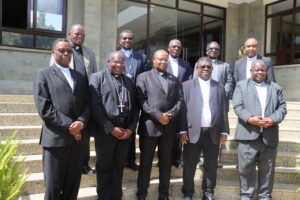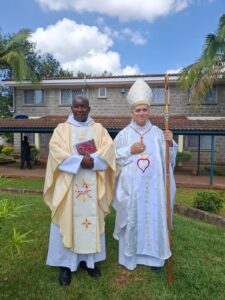KENYA: Faith-based Organization Concerned about Absence of African Governments in UN Treaty Negotiations

Sr. Jecinter Antoinette Okoth, FSSA
Faith-based international network present in Africa and Europe, has raised concern about the absence of African governments in the United Nations (UN) negotiations on Legally Binding Treaty (LBI) on Business and Human Rights which has been ongoing since 2014.
In their report published Monday, January 10, members of Africa Europe Faith and Justice Network (AEFJN) whose aim is to promote economic justice between the European Union and sub-Saharan Africa so that the poor of Africa may look forward to a better future, notes that the idea of the treaty is “to protect the people of developing countries from the violations and crimes committed by Transnational Companies (TNCs) in the exercise of its economic activity.”
Besides, the relevance of the treaty is to ensure “responsibility of companies for crimes committed against human rights and the environment, guarantee access to justice for victims and affected communities, remedy violations of the human rights and compensate the victims, as well as ensuring that the standards of respect and prevention of human rights are mandatory and not voluntary.”
The religious leaders in Africa and Europe decry that the presence of the African Union (AU) and the different African governments in the negotiation of the treaty was “almost insignificant in the last session of the working group for the elaboration of the LBI,” held October 2021, and “Only 4 out of 54 (African) countries made significant contributions.”
They lament further that the commitment of African governments in recent years has “decreased with the progress of negotiation of the LBI, and they have hardly made interventions expressing strong interest in achieving the objectives of the treaty,” saying that “Not even the African Union has sent a delegation or read any institutional statement supporting the creation of the LBI.”
This silence during the LBI negotiations they note, “Is difficult to understand when what is at stake is the lives of millions of people in Africa.”
The Members of AEFJN which comprise of fifty Catholic Missionary or Religious Societies present in Africa and in Europe have disclosed in their report the inappropriate behaviors carried out by TNCs and which for decades have been reported against public and private institutions including environmental disasters, economic crimes, or systematic violations of human rights among others.
They note that it is only through negotiations in the treaty that “real possibility of achieving effective mechanisms to hold TNCs responsible for such behavior” can be achieved, to “allow those responsible be brought to justice.”
Additionally continues the report, LBI gives “an opportunity to end the impunity of TNCs and allow local communities in the poorest countries to have the tools to protect their natural resources and guarantee the protection of their population.”
In the report signed by the Policy Officer José Luis Gutiérrez Aranda, the AEFJN members underscore that the lack of commitment of African governments in the negotiations of the LBI “allows the positions defended by rich countries that are more permissive to the economic powers of large corporations to gain prominence in the negotiations, (and) the lack of a forceful position that defends the interests of Africa allows TNCs to develop their strategies and exempt themselves from their obligations to respect human rights and the environment, which is ultimately respect for the lives of people living in Africa.”
When Africa is silent, religious leaders in Africa and Europe say, the “attitude allows large companies to continue developing their strategies to exploit Africa’s natural resources to enrich themselves at the expense of the needs of the population.”
According to Members of AEFJN the “success of the LBI will not depend exclusively on the result of the text that emerges from the negotiations but will require a serious commitment from the governments of the States that sign the treaty to facilitate its implementation, as well as the creation of adequate national legislation to prosecute human rights violations.”
“Along with this, a serious commitment against the corruption that is threatening the prosperity of the African continent will be necessary,” they said.


